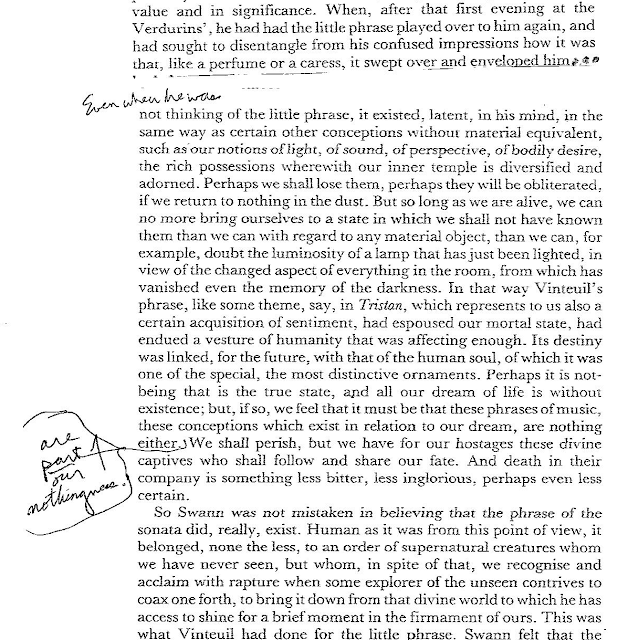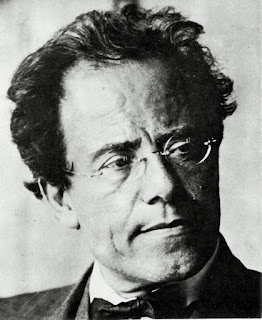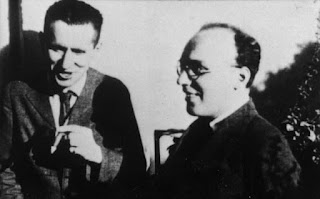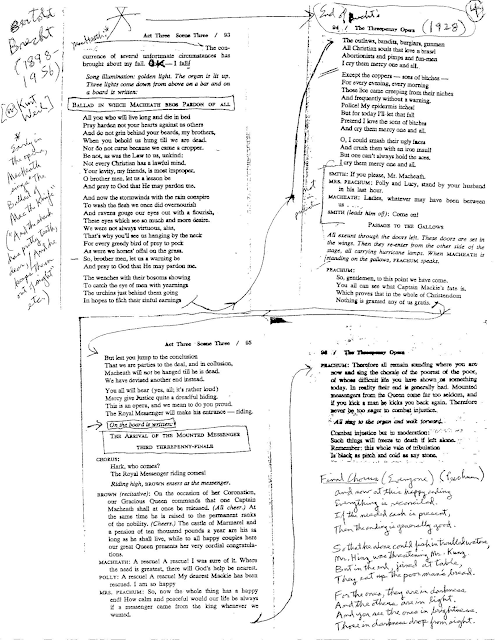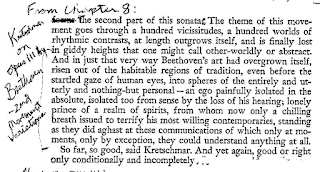I've published through Amazon (including Kindle) a much revised and enlarged version of my 2011 retelling in contemporary Israel of the Sacrifice of Isaac, updated now to the possibility of a nuclear exchange with Iran, and adding newly developed characters. Its title is "A Burnt Offering - a fable and linked story." The latter refers to a character appearing in the fable, Dr. Morris Weisberg, who is fully introduced by the story and is the subject of an unpublished novel of mine, "Pathological States." Here's an image of the cover, and to the right there should be a live link to the Amazon site for "A Burnt Offering." The photo on the cover conveys an impression of two main characters, Ari and Elena Schneider.
Daniel Melnick's Blog
FICTION about Armenians, Israel, music, & medicine. NOTES ON LITERATURE, ART, POLITICS, AND MUSIC
About the arts and ideas - on my novels and literature, music, and art
A new book about Beethoven gathers together (and completely rewrites and supplements) my blog posts on Beethoven into a short introduction to the composer, Ways of Hearing Beethoven, which I hope to see published. My novel The Fall of the Berlin Wall, completed a year ago, is about musicians and particularly the intense, irrepressible daughter of the legendary pianist featured in my previous novel Hungry Generations, now fifteen years after those events. Five years ago, my 2015 novel, The Ash Tree, was published by West of West Books in conjunction with the April 24, 2015 centenary of the Armenian genocide; it's about an Armenian-American family and the sweep of their history in the twentieth century - particularly from the points of view of two women in the family.
There are three other novels of mine, which I would love to see published. One is Pathological States, about a physician's family in L.A. in 1962. Another is Hungry Generations, about a young composer's friendship in L.A. with the family of a virtuoso pianist, published on demand by iUniverse, which I think would be of value to a conventional publisher. A Burnt Offering - a fable (a full rewriting and expansion of my earlier Acts of Terror and Contrition - a nuclear fable) is my political novella about Israel and its reactions to the possibility of a war with Iran (with the fear that it will be a nuclear war).
[My blog posts are, of course, copyrighted.]
[My blog posts are, of course, copyrighted.]
Sunday, June 14, 2020
A New Novel - A Burnt Offering
I've published through Amazon (including Kindle) a much revised and enlarged version of my 2011 retelling in contemporary Israel of the Sacrifice of Isaac, updated now to the possibility of a nuclear exchange with Iran, and adding newly developed characters. Its title is "A Burnt Offering - a fable and linked story." The latter refers to a character appearing in the fable, Dr. Morris Weisberg, who is fully introduced by the story and is the subject of an unpublished novel of mine, "Pathological States." Here's an image of the cover, and to the right there should be a live link to the Amazon site for "A Burnt Offering." The photo on the cover conveys an impression of two main characters, Ari and Elena Schneider.
Wednesday, January 1, 2020
The Ash Tree chapter 1
The first chapter of my novel "The Ash Tree" about Armenian-Americans in the aftermath of the 1915 Armenian Genocide in Turkey. It was recorded last summer and posted on YouTube with images on December 31, 2019. In 2015, the centenary of the 1915 Genocide, it was published by a small non-profit press in the Central Valley of California, West of West Books, and in 2016, it was the sole book with Armenian content chosen for the short-list of Stanford's William Saroyan Prize.
Sunday, September 1, 2019
Updated sequel to "Hungry Generations" - a new novel "The Fall of the Berlin Wall"
The Fall of the Berlin Wall is a sequel to my earlier novel, “Hungry Generations,” about characters in their late twenties in Los Angeles circa 1972; it featured a legendary German-Jewish/Russian émigré piano-virtuoso, the ‘sacred monster’ Alexander Petrov, his wife and two adult children, as well as the composer and their friend Jack Weinstein, as a young man.
Now those characters are in their forties in Cleveland in November 1989,
and the novel is about personal crises echoing the fall of the Berlin Wall and
that upturning of the old order. Jack has become a successful composer and educator,
and he is married to Sarah, the intense and irrepressible daughter of the late
virtuoso.
The culture of classical music is
represented here by Cleveland Orchestra musicians and memories of émigrés in
flight from Nazi Europe, some of whom raised their American children in Los
Angeles. The lives of the young are partly shaped by popular culture – its
music, its preferred drugs, and the influence of punk. The culture of the
family is also at risk from memories and betrayals, and members of the
Weinstein family share the telling of this story. A surprising bonus is the
magnificent music played and imagined here.
It is Thanksgiving week, and Jack does not
understand why the couple’s marriage is collapsing. Visiting them for
Thanksgiving is Sarah’s brother, Joseph Petrov, who is Jack’s closest friend;
the hugely talented pianist son of Alexander is now caught in the middle
between his sister and his brother-in-law. The week’s events are told by this
trio of characters, and much of the novel revolves around Sarah – her
Dostoyevskian intensity, her suffering, her stinging repartee, and the
friendships she forms and betrays.
Friendship itself is a force – emotional,
erotic, and imaginative – in the lives of these characters, with its potential
success or failure for her and Jack, for the brothers-in-law, and for the group
of friends surrounding the three characters. Again, the surprising bonus
of the magnificent music played and imagined here includes Jack’s plans for a
work responding to the fall of the Berlin Wall. The idea that long-standing
barriers can collapse shapes the novel, its vision of politics, of music, and
the past.
This heartbreaking, tragicomic work brings to life each of the human
beings here. The characters in this emotionally compelling, partly political
literary work are reminiscent of Myshkin, Nastasya, and Rogozhin in
Dostoyevsky’s “The Idiot” or, also, of those in a greatly shortened DeLillo’s
“Underworld.” Integrated at the end of the short novel is a section titled “The
Past” containing six “origin” stories that evoke explosively what has been at
stake in the startling past of the characters.
Here’s the synopsis:
The Fall of the Berlin Wall – a novel
“Maybe I’m proud myself, even if I’m shameless. You just called me perfection. A fine perfection! – if just for the sake of being willful I’ve trampled on a fortune and a brilliant man.” --Nastasiya in Dostoyevsky’s The Idiot
Two events in November 1989 mark the lives of the novel’s
characters. One is the death of a woman discovered naked in the snow outside
the Weinstein house, during a massive storm buffeting Cleveland on
Thanksgiving. The other event is the fall of the Berlin Wall, taking place two
weeks earlier – an upturning of the old order that corresponds to these
characters’ desire to change their lives.
Jack
Weinstein wants to save his marriage to Sarah, the intense, unpredictable
daughter of the late legendary German-Jewish classical pianist and ‘sacred
monster’ Alexander Petrov. Unaware of what is causing the collapse of the
marriage, he tries to confront her dissatisfaction and shifting allegiances,
and much of the action revolves around her Dostoyevskian intensity, her
repartee, and the friendships she forms and betrays. Sarah and Jack are in
their forties and have a sixteen-year-old daughter, Sue, absorbed by her own
efforts to deal with boys and drugs.
Joseph, Sarah’s brother, is visiting this Thanksgiving week. He
is gay, and his friendship with his straight brother-in-law unfolds dramatically
here. Joseph finds himself in the middle of the
couple’s conflicts. The week’s events are told by the trio of family members.
Both Joseph and Jack are musicians. Joseph Petrov is, like his late father, a
piano virtuoso, and Jack is a classical composer and music professor; one of
his compositions has just been nominated for a Grammy in contemporary classical
music.
The Weinsteins’ friends have their own turbulence. And
friendship – both healing and broken – becomes an issue in all their lives. Each of these
characters has a piece of the solution to the troubles in the family’s lives,
to their joy and grief, to their betrayals, and to a death – possibly a murder
– that takes place in their midst. The Blacks, who live
around the corner, are about to declare bankruptcy, for Jacob has been denied
tenure and become a ‘freeway professor,’ teaching one class here, another there
across town. There are their mutual friends, the Sinclairs, and especially
Robert Sinclair becomes the target of Jacob’s bitterness about his life.
One of the Weinsteins’ best friends is an artist and a bohemian
of sorts, Tom Mubar, who is divorced and shares custody of his
seventeen-year-old son, Paul. Sarah has an affair, and when it collapses, she
is drawn to Tom, who understands – she believes – what a disaster her life has
become, but she painfully discovers that he does not reciprocate her feelings
and is himself trying to endure his own shocks and dangers.
Everything comes to a head when the Weinsteins celebrate
Thanksgiving with Joseph and their friends. At dinner, confrontations erupt
from the tensions brewing all week, and Sarah, already depressed and
disoriented, plummets into potentially suicidal despair.
“The
Fall of the Berlin Wall” is a tragicomic portrait of the confusions and
heartbreaking disasters in love and friendship, and it also pictures what may
endure our collisions – whether it be love, art and music, or simply the welter
of conflicting passions in youth and middle age. Six stories presenting the startling
past of the characters are integrated into the end of the novel.
(The work is about 51,000
words.)
Table of Contents:
Thanksgiving Week
Prologue:
Rachel and Jacob Black – Friday, November 24, 1989
Chapter
1: Joseph – Sunday afternoon, November 19, 1989
Chapter
2: Sarah – Sunday evening at the Weinstein party
Chapter
3: Jack – Monday morning, November 20, 1989
Chapter
4: Joseph – Monday evening at the Ramadanoff party
Chapter
5: Jack – Tuesday afternoon, November 21, 1989
Chapter
6: Sarah – Tuesday evening at Tom Mubar’s party
Chapter
7: Joseph – Wednesday afternoon, November 22, 1989
Chapter
8: Jack – Wednesday evening at Julius and Rose Weinstein’s party
Chapter
9: Joseph – Thanksgiving, Thursday, November 23, 1989
Chapter
10: Sarah – Thursday night at the Weinsteins
Chapter
11: Jack – Friday morning, November 24, 1989
Chapter
12: Sue – Saturday, Christmas Day 1989 in Berlin
The Past - Before the Fall
Chapter
13: Paul’s Story – The Fall of the Berlin Wall – November 9, 1989
Chapter
14 Tom’s Story – Triptych – 1950-1980
Chapter
15: Karen’s Story – Odalisque – September 1983
Chapter
16: Helen’s Story – Contrapuntal Piece – October 1982
Chapter
17: Jacob’s Story – Your Name Is Hiroshima – November 1984
Chapter
18: Julius’s Story – Einstein’s Sorrow – June 1980
Sunday, June 23, 2019
New book from Mark Arax - "The Dreamt Land - Chasing Water and Dust Across California
Knopf has published a brilliant book by Mark Arax, our nephew, titled "The Dreamt Land - Chasing Water and Dust Across California." As I wrote in a review, it's a passionate book with the epic sweep of a classic, at the level of other masterpieces about California like Joan Didion's workl I've followed Mark's work from the beginning, and - completely independent of his help with my book "The Ash Tree" about Armenian-Americans in the aftermath of the 1915 Genocide - I believe that he has grown tremendously from book to book:
"The Dreamt Land" is a wonderfully compelling book about water in the life of a state and above all about California itself - "the dreamt land." It has the passionate engagement and the great epic sweep of a classic. The personal stories, the vivid characters and encounters, and the interlinked portrayals of place and history unfold beautifully. And the book's voice combines a dark awareness of disaster, humiliations, and stark truths, with an affirming urgency that truly gives life to the work. The truth is the book is at the highest level, the sort of brilliant work that deserves a Pulitzer or National Book Award.
There's an Amazon link in the side column.

"The Dreamt Land" is a wonderfully compelling book about water in the life of a state and above all about California itself - "the dreamt land." It has the passionate engagement and the great epic sweep of a classic. The personal stories, the vivid characters and encounters, and the interlinked portrayals of place and history unfold beautifully. And the book's voice combines a dark awareness of disaster, humiliations, and stark truths, with an affirming urgency that truly gives life to the work. The truth is the book is at the highest level, the sort of brilliant work that deserves a Pulitzer or National Book Award.
There's an Amazon link in the side column.

Tuesday, March 26, 2019
Literature and Music - Modernism
Marcel Proust (1871-1922), In Search of Lost Time, from “Swann’s Way” (1913) excerpt.
Gustav Mahler:
Gustav Mahler:
English Translation: …I stand here and wait for my friend; I wait to bid him a last farewell. I yearn, my friend, at your side to enjoy the beauty of this evening. Where are you? You leave me long alone! I walk up and down with my lute on paths swelling with soft grass. O beauty! O eternal loving-and-life-bedrunken world! He dismounted and handed him the drink of Farewells. He asked him where he would go and why must it be. He spoke, his voice was quiet. Ah my friend, Fortune was not kind to me in this world! Where do I go? I go, I wander in the mountains. I seek peace for my lonely heart. I wander homeward, to my abode! I'll never wander far. Still is my heart, awaiting its hour. The dear earth everywhere blossoms in spring and grows green anew! Everywhere and forever blue is the horizon! Forever ... Forever ...
Ranier Maria Rilke (1875-1926): texts of poems "Music" and Sonnet to Orpheus I, 3
Arnold Schoenberg, texts for quartet (George's Transcendence) and for the ending of Moses and Aaron.
Moses and Aaron - 1938, Freiberg Orch. and Grundheber (2:10)
Thomas Mann (1875-1955), Doctor Faustus (1947), near the end, chapter 47, on Lamentations of Dr. Faustus; then, earlier texts of Kretchman on op. 111, and Adrian’s thoughts after Kretschmar, culture, and barbarism.
GOING TO SLEEP Now that day has tired me, my spirits long for starry night kindly to enfold them, like a tired child. Hands, leave all your doing; brow, forget all your thoughts. Now all my senses want to sink themselves in slumber. And the soul unwatched, would soar in free flight, till in the magic circle of night it lives deeply and a thousand-fold. (2:25):
Excerpts from Pabst film – (2:02, 15:30, 18:58, 22:40-26:40):
W. B. Yeats (1865-1939) on Pater's aesthetic:
“It taught us to walk upon a rope, tightly stretched through serene air, and we were left to keep our feet upon a swaying rope in a storm.”
--from “Sailing to Byzantium”
An aged man is but a paltry thing,
A tattered coat upon a stick, unless
Soul clap its hands and sing, and louder sing
For every tatter in its mortal dress.
Beethoven’s Piano Sonata No. 32 in c minor, opus 111, second movement variations:
Claudio Arrau (9, 13:43, 15:29, 17:37, 18:14, 20:47)
Subscribe to:
Posts (Atom)



